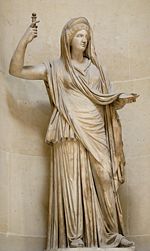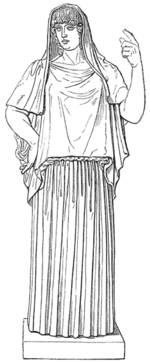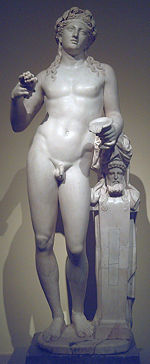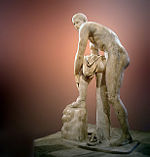Twelve Olympians

The Twelve Olympians, also known as the Dodekatheon (Greek: Δωδεκάθεον < δωδεκα, dodeka, "twelve" + θεον, theon, "of the gods"), in Greek mythology, were the principal gods of the Greek pantheon, residing atop Mount Olympus. The first ancient reference of religious ceremonies for the 12 Olympians is found in the Homeric Hymn to Hermes. The classical scheme of the Twelve Olympians (the Canonical Twelve of art and poetry) comprises the following gods: Zeus, Hera, Poseidon, Demeter, Ares, Hermes, Hephaestus, Aphrodite, Athena, Apollo, Artemis, Hestia. The respective Roman scheme comprises the following gods: Jupiter, Juno, Neptune, Ceres, Mars, Mercury, Vulcan, Venus, Minerva, Apollo, Diana and Vesta.[1]
There was, however, a great deal of fluidity when it came to who was counted among their number in antiquity.[2] Around 400 BC Herodorus included in his Dodekatheon the following deities: Zeus, Poseidon, Hera, Athena, Hermes, Apollo, Alpheus, Cronus, Rhea and the Charites.[3] Wilamowitz agrees with Herodorus' version of the 12.[4]
Herodotus includes Heracles as one of the Twelve.[5] Lucian also includes Heracles, and also includes Asklepios, as members of the Twelve, without explaining which two had to give way for them. At Kos, Heracles and Dionysus are added to the Twelve, and Ares and Hephaestus are left behind.[6] However, Pindar, Apollodorus,[7] and Herodorus disagree with this. For them Heracles is not one of the Twelve Gods, but the one who established their cult.[3]
Plato connected the Twelve Olympians with the twelve months, and proposed that the final month be devoted to rites in honor of Pluto and the spirits of the dead, implying that he considered Hades, one of the basic chthonic deities, to be one of the Twelve.[8] Hades is phased out in later groupings due to his chthonic associations.[9] In Phaedrus Plato aligns the Twelve with the Zodiac and would exclude Hestia from their rank.[10]
Hestia is sometimes displaced by Dionysus.[9] Hebe, Helios and Persephone are other important gods, goddesses, which are sometimes included in a group of twelve.
The Twelve Olympians gained their supremacy in the world of gods after Zeus led his siblings to victory in war with the Titans. Zeus, Hera, Poseidon, Demeter, Hestia, and Hades were siblings. Ares, Hermes, Hephaestus, Aphrodite, Athena, Apollo, Artemis, the Charites, Heracles, Dionysus, Hebe, and Persephone were children of Zeus. Although some versions of the myth state that Hephaestus was born of Hera alone.
Contents |
Detail
Classical Olympians
| Greek Deities Series | ||||||||||||
|---|---|---|---|---|---|---|---|---|---|---|---|---|
| Primordial deities | ||||||||||||
| Titans (predecessor deities) | ||||||||||||
| Greek sea gods | ||||||||||||
| Chthonic deities | ||||||||||||
| Muses (personified concepts) | ||||||||||||
| Other deities | ||||||||||||
| The Twelve Olympians | ||||||||||||
|
| Greek Name | Roman Name | Statue | God(dess) Of... | Generation |
|---|---|---|---|---|
| Zeus | Jupiter |  |
King of the Gods and ruler of Mount Olympus; god of the sky, thunder, and justice. | First |
| Hera | Juno |  |
Queen of the Gods and of the heavens; goddess of women, marriage, and motherhood. | First |
| Poseidon | Neptune |  |
Lord of the Sea; god of the seas, earthquakes, created horses. | First |
| Demeter | Ceres |  |
Goddess of fertility, agriculture, nature, and the seasons. | First |
| Hestia | Vesta |  |
Goddess of the hearth and home (left so Dionysus could be in the twelve). | First |
| Aphrodite | Venus | Goddess of love, beauty, desire, and fertility. | Second | |
| Apollo | Apollo |  |
The Sun God; god of light, healing, music, poetry, prophecy, archery and truth. | Second |
| Ares | Mars |  |
God of war, frenzy, hatred, and bloodshed. | Second |
| Artemis | Diana |  |
Goddess of the hunt, of maidens, and the moon. | Second |
| Athena | Minerva |  |
Goddess of wisdom, crafts, and strategic battle. | Second |
| Dionysus | Liber |  |
God of wine, parties, and merriment (Became an Olympian when Hestia left). | Second |
| Hephaestus | Vulcan |  |
Blacksmith to the Gods; god of fire and the forges. | Second |
| Hermes | Mercury |  |
Messenger of the Gods; god of commerce, speed, thieves, and trade. | Second |
Other definitions
These are not included in the classical list of the Twelve Olympians, but they are sometimes included in other lists of the Twelve Olympians, as noted above.
- Alpheus - A river-god.
- Asklepios - God of medicine and healing.
- the Charites - Goddesses of charm, beauty, nature, human creativity and fertility.
- Cronus - Titan; father of Zeus.
- Hades - Lord of the Dead; god of the Underworld and earthly (gems and precious metals) wealth.
- Hebe - Goddess of youth, and cupbearer.
- Helios - Titan; Personification of the Sun.
- Heracles - Greatest hero of the Greek myths.
- Persephone - Goddess of the spring and death, daughter of Demeter.
- Rhea - Titaness; mother of Zeus.
Close to the Olympians
- Bia - Personification of violence.
- Cratos - Personification of power.
- Dione - Mother of Aphrodite by Zeus.
- Eileithyia - Goddess of childbirth; daughter of Hera and Zeus.
- Eos - Personification of Dawn.
- Eris - Goddess of Discord.
- Eros - God of lust and desire.
- Ganymede - Cupbearer of the gods palace at Olympus.
- Horae - Wardens of Olympus.
- Iris - Personification of the Rainbow, also the messenger of Olympus along with Hermes.
- Leto - Titaness; the mother of Apollo and Artemis.
- Morpheus - God of Dreams.
- Muses - Nine ladies of science and arts.
- Nemesis - Greek goddess of retribution and revenge.
- Nike - Goddess of victory.
- Pan - God of the wild, shepherds, nature, and animals.
- Paean - Universal healer.
- Perseus - Zeus' son, one of the greatest heroes in all of Greek mythology.
- Selene - Titaness; Personification of the Moon.
- Zelus - Emulation.
See also
- Ancient Greek religion
- Family tree of the Greek gods
- Greek mythology
- List of Greek mythological characters
- Supreme Council of Ethnikoi Hellenes
- Dii Consentes (its equivalent on the pantheon of Ancient Rome)
References
- ↑ "Greek mythology". Encyclopedia Americana 13. (1993).
* "Dodekatheon". Papyros-Larousse-Britanicca. (2007). - ↑ According to Stoll, Heinrich Wilhelm (translated by R. B. Paul) (1852). Handbook of the religion and mythology of the Greeks. Francis and John Rivington. pp. 8. "The limitation of their number [of the Olympians] to twelve seems to have been a comparatively modern idea".
- ↑ 3.0 3.1 "Dodekatheon". Papyros-Larousse-Britanicca. (2007).
- ↑ Wilamowitz-Moellendorff, Ulrich von (1931-1932) (in Deutch). Der Glaube der Hellenen (Volume 1). Berlin: Weidmansche Buchhandlung. pp. 329.
- ↑ Herodotus, The Histories, 2.43-44
- ↑ Berger-Doer, Gratia (1986). "Dodekatheoi". Lexicon Iconographicum Mythologiae Classicae 3. 646-658.
- ↑ Pindar, Olympian Odes, 10.49
- ↑ Plato, The Laws, 828d-e
- ↑ 9.0 9.1 "Greek mythology". Encyclopedia Americana 13. (1993).
- ↑
 , Plato: Phaedrus, 246e-f
, Plato: Phaedrus, 246e-f